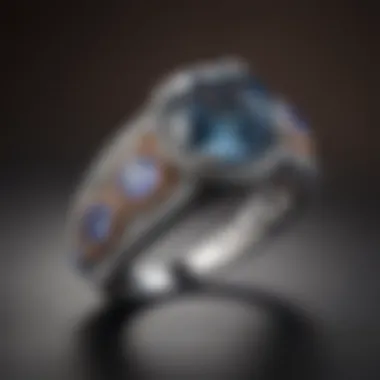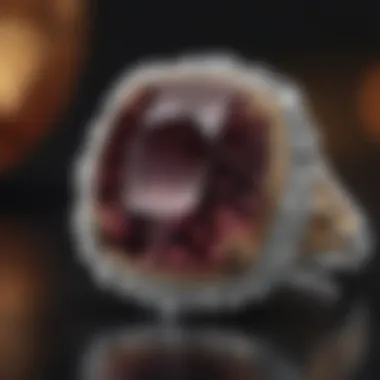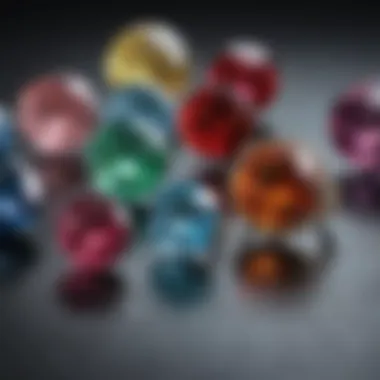A Practical Guide to Appraising Your Engagement Ring


Intro
Appraising an engagement ring can be an intricate process. Understanding the nuances involved is essential, whether you are a seasoned gemstone collector or a newcomer to the jewelry world. The significance of accurate appraisal extends beyond mere valuation; it encompasses the preservation of your ring’s identity and worth.
In this guide, we will explore various aspects that contribute to the appraisal experience. We will discuss the importance of appraisal, identify different types of appraisers, and clarify what you can expect during the evaluation process. Additionally, we will delve into preparation steps for an appraisal and how to decipher an appraisal report.
Our aim is to provide a clear, detailed, and insightful resource that helps you navigate the sometimes complex but rewarding journey of engaging with your ring’s value.
Understanding Engagement Ring Appraisal
Engagement rings are not merely pieces of jewelry; they carry profound sentimental value and often represent significant financial investments. Understanding engagement ring appraisal is crucial for several reasons. Appraisal provides an accurate evaluation of the ring's worth, which is necessary for insurance purposes, resale, or even estate planning.
Definition of Appraisal
Appraisal is the process of assessing the value of an item, in this case, an engagement ring. A qualified appraiser analyzes various components, including the quality of the gemstones, metal used, and overall craftsmanship. The result is a detailed report documenting the ring's characteristics and its market value. This process is essential for establishing a reliable valuation, ensuring that all aspects of the ring are considered.
Importance of Appraisal
The importance of appraisal cannot be overstated. First, it assures that you are aware of the ring's true value, which helps in making informed decisions about insurance coverage. Without an appraisal, you could be under-insured or over-insured, leading to financial loss in the event of loss, theft, or damage.
Second, an appraisal provides documentation that is often required by insurance companies when filing a claim. Having a formal report can streamline the claims process, preventing prolonged disputes over the ring's worth.
Third, appraisal can boost your confidence when selling or trading the ring. Knowing its value allows you to set a fair price, which can lead to smoother transactions. Furthermore, an appraisal can also aid during estate planning, offering clarity about assets for heirs and financial advisors.
"A proper appraisal is an investment in your peace of mind, ensuring your engagement ring is protected adequately."
In summary, understanding engagement ring appraisal is vital for safeguarding your investment, preparing for future financial decisions, and ensuring that your most cherished possessions are appropriately valued.
Types of Appraisal Services
Understanding the various types of appraisal services available is crucial for anyone seeking an accurate valuation of their engagement ring. The right appraisal service can lead to clear insights about the ring's worth and its characteristics. Each type of service offers different methodologies and levels of expertise, which will affect the final appraisal outcome.
Professional Appraisers
Professional appraisers specialize in evaluating gemstones and jewelry. These individuals often have certifications from recognized organizations, which demonstrates their expertise. A key benefit of using a professional appraiser is the depth of knowledge they bring to the table. They can identify various factors that affect the value of a ring, including the quality of the gem, the craftsmanship of the setting, and market trends.
When selecting a professional appraiser, it is important to ensure they have relevant credentials. This might include certification from respected bodies such as the Gemological Institute of America (GIA) or the American Society of Appraisers (ASA). Professional appraisers generally follow strict guidelines while conducting valuations, which enhances the reliability of their assessments.
Independent Jewelers
Independent jewelers often provide appraisal services, capitalizing on their direct expertise with gemstones. They have hands-on experience, which allows them to accurately gauge the quality of both the gem and its setting. Since many independent jewelers buy and sell rings, they possess valuable market insights that can reflect in the appraisal's accuracy.
However, it's essential to be cautious when using an independent jeweler for appraisal. Their primary interest might lean towards selling jewelry, which can create a potential conflict of interest. Always inquire about their appraisal process and whether they provide a detailed report that outlines their findings. This transparency is vital to ensure you receive an honest appraisal.
Gemological Laboratories
Gemological laboratories are another reputable option for obtaining an appraisal. These institutions employ multiple qualified gemologists who assess rings based on precise scientific criteria. Many of them provide comprehensive reports detailing every aspect of the ring, including its dimensions, weight, and gemstone quality.
Gemological laboratories, such as the GIA, are highly regarded in the gemstone community. They use advanced technology and standardized methods to evaluate gemstones. As a result, their reports are often considered more objective than those from individuals or jewelers. When choosing a gemological laboratory, look for accreditation and industry recognition to ensure you receive the best possible evaluation.
"A formal appraisal allows you to understand the true value of your engagement ring, providing necessary documentation for insurance and resale."
Preparing for an Appraisal
Preparing for an appraisal is a crucial step that should not be overlooked. This phase involves several meticulous actions that lay the groundwork for a successful evaluation of your engagement ring. Having a well-structured preparation enhances the credibility of the appraisal process and ensures that you get an accurate assessment of your ring's value.


The better prepared you are, the smoother the appraisal will go. You will also feel more informed, as this knowledge can help you during discussions with the appraiser. Moreover, taking the right steps not only saves time but can often improve the final value attribution of your ring.
Collecting Relevant Documents
Gathering all pertinent documents is essential before heading for the appraisal. Start by locating any original purchase receipts. This will provide a baseline value and essential information about design and materials used. If you have previous appraisals or any certificates from jewelry organizations, be sure to include those as well.
Documents to consider collecting include:
- Purchase receipts: Establishes how much you originally paid and gives context.
- Previous appraisals: Offers insights into the ring's market value over time.
- Documentation on gemstones: Certificates from organizations like the Gemological Institute of America (GIA) can enhance credibility.
- Photos: Documenting the ring's condition helps appraisers assess its current state accurately.
Cleaning the Ring
A clean and well-maintained ring is crucial for a precise appraisal. Dirt and grime can obscure the true beauty of the gemstones and the quality of the metal. Before the appraisal, gently clean the ring using a soft cloth or a mild soap solution. Avoid harsh chemicals that might damage the ring. Consider taking it to a professional jeweler for a thorough cleaning if necessary.
Regular maintenance is vital. If the ring has been worn frequently, it may require more substantial care. The cleaner your ring is, the clearer the appraisal will be.
Determining Appraisal Goals
Understanding your goals for the appraisal is vital. Are you seeking insurance coverage, preparing for eventual resale, or simply wanting to know the current market value?
Identifying your objectives will guide you in the type of appraisal service you select. For instance, if you aim for insurance valuation, a detailed, formal report will be necessary. If you are interested in resale value, the appraiser will focus more on the current market trends.
Establishing specific goals will also help you formulate key questions to ask the appraiser, ensuring you get the information you need to make informed decisions.
"A thorough preparation for an appraisal not only saves time but also maximizes the potential value assigned to your engagement ring."
The Appraisal Process Explained
The appraisal process is essential in determining the value of your engagement ring. By navigating through a structured evaluation, individuals can gain a clearer understanding of what their ring is worth. This section outlines the major components of the appraisal process while highlighting its significance in both personal and financial decision-making for gemstone owners.
Initial Assessment
The initial assessment is the starting point for any appraisal. During this phase, the appraiser conducts a preliminary look at the ring, noting its general attributes. Factors assessed include the overall condition, carat weight, and visible gemstone characteristics.
In many cases, the appraiser will ask the owner questions regarding the purchase history and any previous appraisals, as this information can be vital. An experienced appraiser can quickly determine if the ring requires further inspection or if basic information is sufficient. This phase sets the groundwork for a more thorough analysis.
Detailed Evaluation
Once the initial assessment is complete, the detailed evaluation phase follows. This is where the appraiser examines the engagement ring's components more rigorously. Various characteristics such as clarity, color, cut, and carat weight (often referred to as the "four Cs") are critically evaluated.
The jewelry's setting and workmanship are also considered in the final valuation. This evaluation often involves specialized tools and techniques. An example would be using a microscope to examine the gemstone for inclusions or flaws that may not be visible to the naked eye. The appraiser may also use a refractometer or a spectroscope to analyze the material composition of the gem.
This phase is crucial to accurately determining the ring’s value. All elements must be taken into account while also recording them systematically.
Final Review and Report Generation
After the detailed evaluation, the appraiser moves onto the final review and report generation. This is where the appraiser summarizes all findings and creates a comprehensive report. This report will include a detailed description of the ring, thorough evaluations of each component, along with photographs, if necessary.
The report serves multiple purposes. First, it provides documentation that can be used for insurance purposes. Second, it establishes a baseline for future appraisals, should the ring undergo modifications or changes in the market. Furthermore, the report presents a clear outline of what factors contributed to the assessed value. A well-structured appraisal report can aid in understanding how value fluctuates over time, establishing a useful context for making informed decisions regarding the ring.
In summary, the appraisal process is an intricate journey from initial assessment through detailed evaluation to the final report generation. Each step includes specific insights that contribute to the overall understanding of the engagement ring's value. Understanding this process is not only beneficial for the owner but can also shape future discussions about its worth and significance.
What to Expect from an Appraisal Report
The appraisal report serves as a vital document following the evaluation of an engagement ring. It outlines the findings of the appraisal and provides essential details about the ring's value, characteristics, and authenticity. Understanding what to expect from an appraisal report is crucial for gemstone enthusiasts, collectors, and anyone wishing to protect their investment. A well-organized report can assist in insurance matters, resale opportunities, and estate planning.


Components of an Appraisal Report
An appraisal report generally consists of several key components. These elements contribute to a comprehensive overview of the ring:
- Identification of the Item: This includes a description of the ring, such as its type, materials used, and design features.
- Evaluation of Gemstones: Detailed information on the gemstones, including carat weight, clarity, color, and cut.
- Metal Composition: A breakdown of the metal type used in the setting, such as platinum, gold, or silver, along with purity levels.
- Market Analysis: A professional assessment of current market trends and how they impact the ring's value.
- Photographs: Visual documentation that captures the ring from multiple angles, aiding in identification and authenticity.
These components together ensure that the report is thorough and serves its purpose effectively.
Understanding Value Estimates
Value estimates are a critical aspect of an appraisal report. The appraiser uses various methodologies to arrive at a fair market value. This value can differ based on several factors, including:
- Market Demand: Prices fluctuate according to market trends.
- Condition of the Ring: Any wear or damage can affect the overall value.
- Historical Significance: Rings with a notable history might command a higher price.
It’s important to recognize that the value estimate in an appraisal report does not always reflect the retail price. Instead, it is often based on what the gem would sell for in the current market environment.
Use of Appraisal Reports
Appraisal reports serve several purposes. For some, they are essential for insurance purposes. Insurers may require an appraisal to determine coverage and premium amounts. For others, an appraisal report provides an authentication process, confirming that the ring is genuine and accurately represents its described value. Additionally:
- Resale Transactions: If you plan to sell the ring, a detailed appraisal report can justify your asking price to potential buyers.
- Estate Planning: In estate matters, an appraisal report is helpful in determining the value of assets.
In summary, the appraisal report is not just a formal document; it is a comprehensive analysis that can protect your investment and guide future decisions related to your engagement ring.
Choosing the Right Appraiser
Choosing the appropriate appraiser is a crucial step in the engagement ring appraisal process. The right appraiser not only provides an accurate valuation but also ensures that you understand the many nuances involved in evaluating your ring. An adept appraiser can help you recognize the intrinsic value of the gemstones and the craftsmanship behind the piece. In this section, we will delve deeper into the essential considerations when selecting an appraiser, highlighting qualifications, questions to ask, and the importance of verifying credentials.
Qualifications to Consider
One of the first steps in choosing an appraiser is to assess their qualifications. A reputable appraiser should hold professional certifications, such as a Graduate Gemologist from the Gemological Institute of America (GIA) or an appraiser certification from the American Society of Appraisers (ASA). These qualifications often indicate a solid foundation of knowledge in gemology and appraisal methods.
When evaluating potential appraisers, consider the following:
- Experience: Look for an appraiser with extensive experience in appraising engagement rings and fine jewelry specifically.
- Specialization: Some appraisers might specialize in certain types of jewelry or gemstones. Ensure their expertise aligns with the type of ring you have.
- Reputation: Seek reviews or testimonials from past clients. A strong reputation can be indicative of a trustworthy and knowledgeable appraiser.
Asking the Right Questions
When you consult with an appraiser, it is imperative to ask questions that can help gauge their expertise and understanding of your specific needs. Below are some critical questions to consider:
- What experience do you have with engagement rings? This helps you understand their familiarity with the type of jewelry you are having appraised.
- Can you provide references? Asking for references can give you insights into the appraiser’s reliability and skill level.
- What methods do you use for appraisal? An appraiser's methodology can impact the valuation, so it's important to know what approach they take.
- Do you ensure your valuations are based on current market values? This can help in understanding how the appraisal reflects current market trends.
Verifying Credentials
Verifying an appraiser’s credentials is essential for ensuring that you receive a valid and accurate appraisal. You should always confirm if the appraiser is a member of professional organizations relevant to gemology and appraisal. Membership in groups like the Gemological Institute of America or the National Association of Jewelry Appraisers indicates a standard of professionalism and a commitment to ongoing education.
Additionally, you may want to check:
- Licenses: In some regions, appraisers need specific licenses to operate, especially for insurance purposes. It’s good to verify these licenses before moving forward.
- Certifications: Ensuring certifications are current is vital. If an appraiser's credentials are outdated, their knowledge may not reflect current practices or market changes.
- Continuing Education: A sign of a committed appraiser is their ongoing education in gemology and appraisal practices. This can show that they stay updated on developments in the field.
It is essential to conduct thorough research before choosing an appraiser. Proper selection can make a significant difference in how much you understand about your ring's value and the assurance that comes from a professional valuation.
Choosing the right appraiser is not only about securing a competent evaluation but about establishing a trustworthy partnership in understanding your asset. By focusing on qualifications, asking pointed questions, and verifying credentials, you can ensure a smooth appraisal process that meets your expectations.
Common Appraisal Mistakes to Avoid


Avoiding common mistakes during the appraisal process is crucial to achieve accurate and fair valuations of engagement rings. Understanding these pitfalls helps ensure that one does not overpay for insurance or purchase a ring without proper documentation. Recognizing these mistakes empowers individuals to approach the appraisal process with awareness and confidence.
Overestimating Value
When getting an engagement ring appraised, a frequent mistake is overestimating its value. This issue often stems from inflated expectations based on sentimental value or the original purchase price. A ring may have significant emotional significance, but this does not always correlate to monetary worth. Most often, market trends and consumer demand dictate value.
Making assumptions about the ring's value, without a professional assessment, can lead to misguided financial decisions. An inflated estimate could inflate insurance costs, or may complicate matters when trying to sell the ring in the future. Therefore, consulting a certified and experienced appraiser is essential to establish a realistic value that reflects the current market.
Choosing an Inexperienced Appraiser
Another common mistake arises when individuals select inexperienced appraisers. An unqualified appraiser may lack the necessary knowledge, skills, or references to assess the value accurately. Such appraisals can result in unrealistic values and create a false sense of security.
When choosing an appraiser, it is vital to evaluate qualifications and credibility. Look for certifications from recognized organizations, such as the Gemological Institute of America (GIA) or the American Society of Appraisers (ASA). It can also be advantageous to gather recommendations from credible sources or consult online reviews. Selecting an experienced appraiser not only ensures trustworthy evaluations but also fosters confidence in the overall appraisal process.
Ignoring Documentation
The third common mistake is ignoring relevant documentation related to the engagement ring. Many individuals may possess receipts, grading reports, or previous appraisals that help provide a clearer picture of the ring's history and value. These documents are instrumental during an appraisal and serve as the foundation for an accurate assessment.
Neglecting this documentation can lead to confusion and miscommunication with the appraiser. It is wise to collect any available paperwork regarding the ring before scheduling the appraisal. Additionally, understanding the ring's provenance can enhance the overall appraisal accuracy. When all relevant materials are considered, the appraiser has a more substantial basis for determining value, which can ultimately benefit both insurance and resale considerations.
Legal Implications of Appraisal
Understanding the legal implications of appraising your engagement ring is crucial. This section highlights why knowing these aspects is important. You need to consider how an appraisal affects your ownership rights, insurance policies, and potential tax liabilities. This knowledge can protect your financial investment, especially if your ring is of substantial value.
Insurance Considerations
One primary legal implication revolves around insurance. An accurate appraisal helps in determining the right amount of coverage. Many insurance companies require a professional appraisal for high-value items. Without it, you might face challenges in the event of loss or theft. If the valuation is too low, the insurance payout may not cover replacement costs.
When choosing insurance, consider the following points:
- Policy Coverage: Ensure your policy covers loss, theft, and damage.
- Replacement Value: Know the difference between market value and replacement value; your appraisal should reflect what it would cost to replace your ring.
- Updating Appraisals: Jewelry values can fluctuate over time. It’s prudent to have your appraisals updated regularly to reflect current market valuations.
Tax Implications
Another significant area is tax implications. Appraisals can play a role in gift taxes, estate taxes, and capital gains taxes if you ever decide to sell your ring. An appraisal provides necessary documentation for tax reporting and compliance.
Here are key considerations regarding taxes:
- Gift Tax: If you give your ring as a gift, the appraised value might be considered for tax purposes.
- Estate Tax: Inheritance might involve estate taxes. An appraisal is essential for accurately reporting the value of the assets.
- Capital Gains Tax: If you sell your ring in the future, the appraisal can help in calculating any capital gains tax based on the ring's selling price compared to its appraised value.
"Proper documentation and understanding of legal implications can save you substantial financial headaches in the long run."
End
The conclusion serves as a vital capstone to the exploration of engagement ring appraisal. It is a moment to reflect on not just the procedural aspects but also the deeper implications of understanding value when it comes to such sentimental possessions. This article has covered several important facets surrounding appraisal—the necessity, the methodologies, and the significance of accurate valuations.
First, recognizing the importance of proper appraisal can protect your investment. Engagement rings are often significant financial commitments, and an accurate appraisal ensures that you can defend their value under various circumstances, including insurance claims or resale scenarios. Furthermore, these appraisals create a documented history of the gemstone, which can be valuable for future reference.
Secondly, every section of this guide has emphasized preparation—gathering necessary documentation, cleaning the ring, and defining your appraisal goals. This preparatory phase can greatly influence the outcome, as it sets a clear intention for what you want from the appraisal.
Lastly, selecting the right appraiser and avoiding common pitfalls reflects a deeper appreciation for the value of these pieces. Engaging an experienced, qualified individual brings expertise to the table, leading to more accurate valuations and informed decisions.
In summary, the conclusion encapsulates the article's key themes and demands thoughtful consideration from readers who wish to engage deeply with the value of their possession.
Summary of Key Points
- Appraisal is essential for understanding and safeguarding the value of your engagement ring.
- Preparation significantly affects the appraisal process, thus taking time to gather documents and clean your ring is crucial.
- Choosing a qualified appraiser is paramount; it directly impacts the final appraisal results.
- Awareness of common mistakes can help you avoid pitfalls in the appraisal process.
Final Recommendations
- Ensure you approach appraisal with a clear understanding of your goals—know why you're appraising your ring.
- Prioritize qualifications and experience when selecting an appraiser. Consult multiple sources if necessary.
- Keep meticulous records of the appraisal process, including documentation and communication with appraisers.
- Regular appraisals are advisable, especially if market conditions fluctuate or if you change your insurance policy.
Taking these recommendations into account will not only assist you in obtaining a sensible valuation but also enrich your overall experience with your engagement ring.



